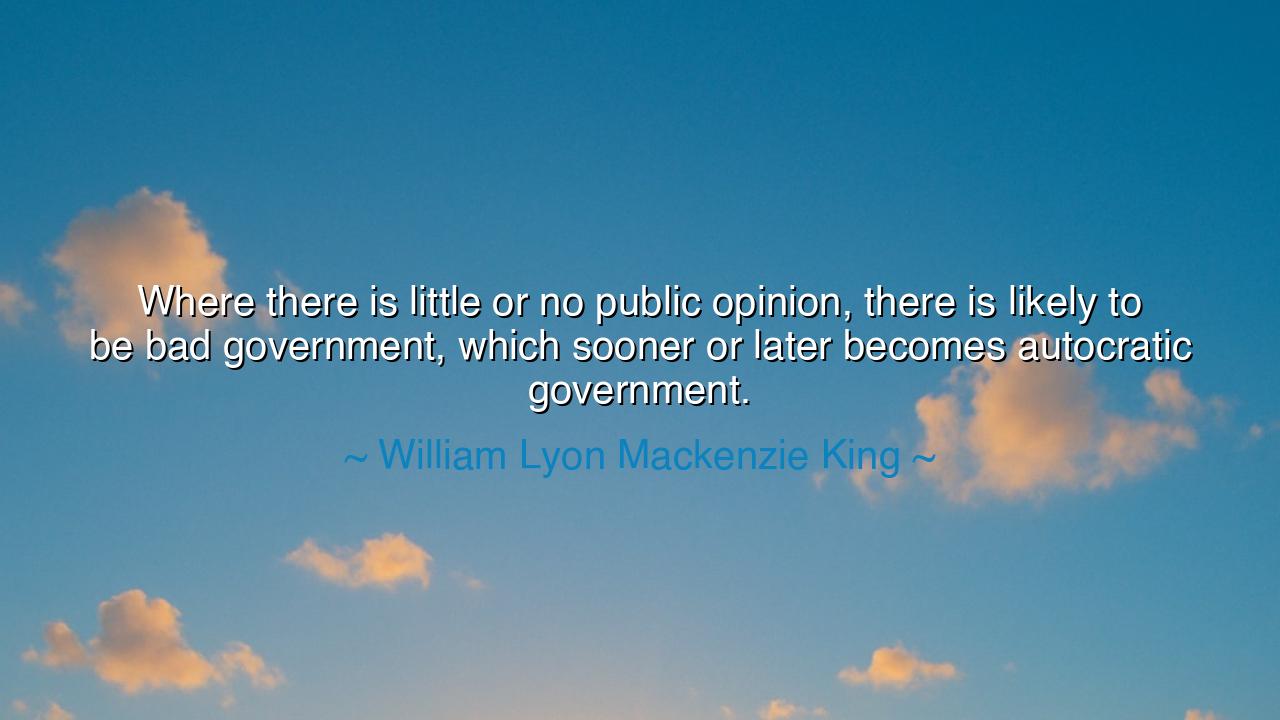
Where there is little or no public opinion, there is likely to be
Where there is little or no public opinion, there is likely to be bad government, which sooner or later becomes autocratic government.






When William Lyon Mackenzie King declared, “Where there is little or no public opinion, there is likely to be bad government, which sooner or later becomes autocratic government,” he spoke as a man who understood both the frailty and the majesty of democracy. His words, though measured and calm, carry the weight of ancient warning — that when the voice of the people grows silent, the throne of power grows arrogant. King, Canada’s longest-serving prime minister, had witnessed firsthand the delicate balance between authority and freedom, between leadership and consent. His statement is not merely political; it is a moral truth — that government, like fire, must be fueled by the watchful eyes and awakened hearts of those it serves, lest it consume all in darkness.
The origin of this quote lies in King’s reflections on democracy’s dependence upon an informed and active citizenry. Born in 1874 and leading Canada through both World Wars, King saw how fear, apathy, and manipulation could erode public vigilance. He understood that public opinion — the collective conscience of the people — is the invisible foundation upon which all free governments stand. Without it, institutions rot from within. A government left unchallenged, unexamined, and unrestrained will soon mistake its convenience for righteousness. What begins as indifference ends in despotism. Thus, King’s warning is not only about politics, but about the eternal vigilance required of every free people.
To grasp his meaning, one must first understand what he meant by “public opinion.” It is not the noise of the crowd or the fury of mobs, but the steady, reasoned awareness of citizens who care about the fate of their nation. It is the conscience of the many, expressed through speech, press, debate, and vote — the living dialogue between rulers and ruled. Where this dialogue ceases, power grows deaf and self-serving. King knew that the silence of the governed is the seed of tyranny. For when people cease to think, to question, and to speak, the state begins to think, decide, and dictate in their place.
History bears grim witness to this truth. Consider Germany in the 1930s, where the voice of the people was lulled into obedience by propaganda, fear, and fatigue. When the public ceased to question, when the press was silenced, and when truth became treason, democracy collapsed into dictatorship. The loss of public opinion became the loss of public freedom. The same pattern can be seen in every age — in Rome’s transformation from republic to empire, in the slow decay of monarchies that forgot their people, and in modern states where censorship and apathy join hands. King’s wisdom was therefore not merely for his own time, but for all times: bad government is born in silence, and tyranny matures in indifference.
Yet his words are not a lament, but a call to awakening. King believed deeply in the capacity of ordinary citizens to preserve their liberty through engagement. The cure for autocracy is not rebellion alone, but participation — the daily act of caring for the common good. Freedom is not secured by the ballot alone, but by a people who read, who question, who speak, who refuse to surrender their judgment to the whims of the powerful. Public opinion, rightly formed, is the heartbeat of democracy; it holds leaders accountable, tempers corruption, and reminds authority of its purpose: service, not dominion.
Consider the story of the Watergate scandal in the United States — a living testament to King’s insight. When the press exposed corruption at the highest levels of government, it was the power of an informed and outraged public that forced accountability. Citizens demanded truth, institutions acted with courage, and justice prevailed. The government, momentarily darkened by deceit, was restored through the light of public scrutiny. This is the miracle of democracy when it breathes — a people’s collective conscience rising to correct its own course.
The lesson of Mackenzie King’s words is as timeless as the dawn: freedom dies not by force, but by forgetfulness. When citizens cease to care, to question, and to hold power to account, they become complicit in their own subjugation. Therefore, let each person regard the duty of awareness as sacred. Read deeply. Speak truth. Question authority. Stand guard over your institutions, not with violence, but with vigilance. The voice of the people, if honest and awake, is the surest defense against tyranny in all its forms.
And so, remember this teaching: a government ruled by unchecked power will always seek to rule minds as well as bodies. But a nation ruled by the strength of informed citizens can never be enslaved. Let public opinion remain free — not as a weapon of rage, but as the chorus of reason. For as long as the people think, speak, and demand justice, no throne can harden into tyranny, and no leader can forget that he, too, is but a servant of the governed.






AAdministratorAdministrator
Welcome, honored guests. Please leave a comment, we will respond soon